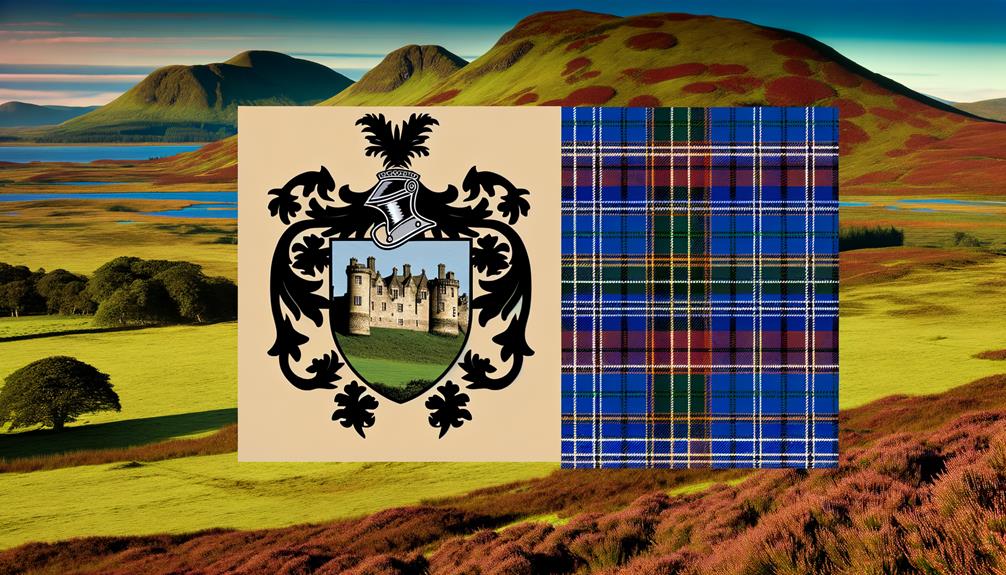Malcolm Name Meaning and Origin
The name Malcolm originates from the Gaelic term 'Màel Coluim,' meaning 'disciple of Saint Columba.' This etymology underscores both religious reverence and historical prominence. The name has deep ties to Scottish royalty, particularly through Malcolm III, whose reign marked a transformative era for the Scottish monarchy.
Saint Columba, a pivotal figure in early Scottish Christianity, further enriches the name's ecclesiastical significance. Over the centuries, Malcolm has been borne by influential personalities, most notably Malcolm X, adding contemporary cultural resonance.
The historical and linguistic journey of the name Malcolm is intriguing, offering rich insights into its enduring legacy.

Key Takeaways
- The name Malcolm originates from the Gaelic 'Máel Coluim,' meaning 'disciple of Saint Columba.'
- It evolved over centuries but retains its core elements of religious devotion.
- Malcolm is historically linked with Scottish royalty, notably King Malcolm III.
- The name symbolizes leadership, resilience, and a deep ecclesiastical connection.
- Modern variations and cultural influences, like Malcolm X, continue to shape its significance.
Etymology of Malcolm
The name 'Malcolm' originates from the Gaelic name 'Máel Coluim,' which translates to 'disciple of Saint Columba.' This etymology reflects the historical and religious influences prevalent during the early medieval period in Scotland and Ireland.
The Gaelic term 'Máel' means 'servant' or 'devotee,' while 'Coluim' refers to Saint Columba, a revered 6th-century missionary credited with spreading Christianity in Scotland. Linguistically, the name evolved through centuries of usage and adaptation, retaining its core elements while evolving into its contemporary form.
Understanding the name 'Malcolm' requires appreciating its deep-rooted connections to Gaelic culture and Christian missionary history, encapsulating a blend of devotion and heritage. This rich etymological background provides insight into the cultural and religious milieu of its origin.
Historical Significance
The name Malcolm holds considerable historical significance, primarily due to its association with Scottish royalty, including several kings such as Malcolm III.
Its connection to Saint Columba, a pivotal figure in the spread of Christianity in Scotland, further enhances its historical weight.
Additionally, the name saw a notable rise in popularity during the medieval period, reflecting its enduring cultural and societal influence.
Scottish Royalty Influence
As a name steeped in Scottish heritage, Malcolm traces its importance back to several medieval Scottish kings, including Malcolm III, whose reign marked a pivotal era in the consolidation of Scottish monarchy and culture.
Malcolm III, also known as Malcolm Canmore, ascended the throne in 1058 after overthrowing Macbeth. His reign was instrumental in establishing the foundations for a unified Scotland, facilitating the integration of various clans under a centralized monarchy.
The name Malcolm, derived from the Gaelic 'Maol Choluim' meaning 'disciple of Saint Columba,' embodies the intertwining of religious and royal elements. Consequently, the name Malcolm became emblematic of leadership and resilience, securing its legacy within the annals of Scottish history.
Saint Columba Connection
Saint Columba, a central figure in early Scottish Christianity, established the influential monastic community on the Isle of Iona in 563 AD. This establishment became a vital center for religious, educational, and cultural development in medieval Scotland.
The name Malcolm, derived from the Gaelic 'Maol Choluim,' directly translates to 'disciple of Columba,' evidencing a strong ecclesiastical linkage. The reverence for Saint Columba greatly contributed to the name's prominence, as it symbolized piety and dedication to Christian values.
Linguistically, 'Maol' means 'follower' or 'devotee,' while 'Choluim' is the genitive form of Columba. This connection highlights the integration of religious devotion into personal nomenclature, reflecting the societal influence of monastic figures in the Gaelic cultural lexicon.
Medieval Popularity Rise
During the medieval period, Malcolm emerged as a favored name among Scottish nobility and royalty, signifying its elevated socio-political stature. The name's prominence is attributed to several kings of Scotland, notably Malcolm III, who reigned in the 11th century. The etymological roots trace back to the Gaelic "Maol Coluim," meaning "disciple of Saint Columba," further enhancing its ecclesiastical and cultural significance.
| King | Reign Period | Historical Impact |
|---|---|---|
| Malcolm II | 1005-1034 | Consolidated Scottish territories |
| Malcolm III | 1058-1093 | Reformed Scottish governance |
| Malcolm IV | 1153-1165 | Strengthened feudal relationships |
| Malcolm V | (Hypothetical) | (No historical records) |
This nomenclature's rise during medieval times underscores its symbolic resonance within the sociopolitical and religious fabric of Scotland.
Malcolm in Scottish Royalty
The name Malcolm holds a prominent place in Scottish history, particularly through the reigns of notable kings such as Malcolm II and Malcolm III, who were instrumental in unifying and consolidating the kingdom.
This royal legacy has not only cemented the name's association with power and authority but also contributed to its enduring presence within Scottish dynastic traditions.
The linguistic roots of 'Malcolm' underscore its Gaelic origins, further enriching its historical and cultural significance.
Historic Scottish Kings
Malcolm, a name deeply embedded in Scottish history, was borne by several notable kings who played pivotal roles in shaping the nation's medieval landscape. Among these monarchs, three stand out for their significant contributions:
- Malcolm II (1005-1034): His reign marked the consolidation of the Scottish kingdom, unifying various factions and expanding territorial control.
- Malcolm III (1058-1093): Also known as Malcolm Canmore, he initiated the Canmore dynasty, which stabilized the throne after decades of Viking invasions.
- Malcolm IV (1153-1165): Known as Malcolm the Maiden, his reign faced numerous challenges but reinforced Scottish sovereignty amidst external pressures.
These historical figures underscore the enduring legacy of the name Malcolm in Scotland's royal lineage, highlighting its profound impact on the country's medieval era.
Royal Malcolm Legacy
Building upon the historical significance of these monarchs, the Royal Malcolm legacy continues to resonate within the annals of Scottish royalty, reflecting a profound influence on the nation's development and governance.
King Malcolm III, also known as Malcolm Canmore, played a pivotal role in consolidating the Scottish monarchy post-Viking invasions. His reign marked the beginning of the Canmore dynasty, fostering political stability and cultural integration. Through strategic marriages and alliances, Malcolm III strengthened ties with neighboring kingdoms, laying the groundwork for future dynastic cohesion.
His successors, including Malcolm IV, maintained this legacy, perpetuating reforms that shaped medieval Scotland's societal structure. The Malcolms' legacy is indelibly etched into the fabric of Scottish history.
Dynastic Influence and Power
A profound dynastic influence emerged under King Malcolm III's reign, reshaping the political landscape and fortifying the power structures of medieval Scotland. His matrimonial alliance with Margaret of Wessex integrated English nobility, enhancing the kingdom's stability.
Malcolm III's strategic reforms and consolidation of power had long-lasting effects:
- Succession Reforms: Established primogeniture, ensuring a stable line of succession.
- Territorial Expansion: Annexed regions, extending Scotland's boundaries and influence.
- Anglicization: Promoted English customs and language, aligning Scottish governance with broader European norms.
Malcolm III's legacy underscored the intricate interplay between dynastic strategies and statecraft, reflecting linguistic evolution and socio-political transformations. His reign marked a pivotal chapter in Scottish history, laying the groundwork for future monarchs.
Cultural Impact
How has the name Malcolm woven itself into the fabric of cultural and historical narratives, shaping its significance through notable figures and literary works?
The name Malcolm, derived from the Gaelic 'Máel Coluim,' meaning 'devotee of St. Columba,' has permeated various cultural spheres.
In literature, Shakespeare immortalized it in 'Macbeth,' rendering Malcolm as a symbol of rightful leadership and moral integrity.
Moreover, the historical legacy of Scottish kings named Malcolm, such as Malcolm III, underscores its association with regal authority and dynastic continuity.
Linguistically, the name's evolution from Gaelic to modern English reflects broader historical shifts and cultural integration.
These multifaceted dimensions underscore Malcolm's enduring resonance within cultural and historical contexts.
Famous People Named Malcolm
Renowned across various fields, individuals named Malcolm have greatly influenced cultural, political, and intellectual landscapes.
Historically significant figures include:
- Malcolm X: A pivotal civil rights leader whose advocacy for African American empowerment and critique of systemic racism reshaped American social dynamics.
- Malcolm McDowell: An acclaimed actor whose performances in films like 'A Clockwork Orange' have left an indelible mark on cinematic history.
- Malcolm Gladwell: A distinguished journalist and author, known for his profound insights into social psychology and cultural phenomena through works such as 'Outliers.'
These Malcolms have contributed to their fields with lasting legacies, embodying the name's strong historical and cultural resonance. Their achievements underscore the name's enduring relevance and inspirational capacity.
Popularity Over Time
The name Malcolm has experienced varying degrees of popularity over the centuries, influenced by historical events, cultural shifts, and individuals of significance bearing the name.
Originating from the Gaelic 'Máel Coluim,' meaning 'devotee of Saint Columba,' it was prominently borne by Scottish royalty, including King Malcolm III.
The name saw a resurgence in the 20th century, partly due to figures like Malcolm X, whose prominence in the Civil Rights Movement elevated its visibility.
Linguistically, Malcolm's phonetic appeal and cultural resonance have kept it in periodic favor, although its popularity has fluctuated.
In the United States, for instance, it reached its peak in the 1990s but has since seen a gradual decline, reflecting broader naming trends and societal influences.
Modern Usage and Variations
Despite its fluctuating popularity, Malcolm continues to be a name of choice in contemporary settings, showcasing various modern adaptations and cultural variations. The name, rooted in Gaelic origins, has evolved to fit diverse linguistic and cultural contexts.
Notable trends in modern usage include:
- Regional Variations: In the United States, Malcolm maintains steady usage, while in the United Kingdom, it has seen a resurgence.
- Cultural Influences: Figures such as Malcolm X have imbued the name with historical significance and cultural resonance.
- Phonetic Adaptations: Variations like Malcom or Malcolme offer phonetic flexibility and contemporary appeal.
These trends highlight Malcolm's enduring versatility, bridging historical roots with present-day adaptability.
Conclusion
The name Malcolm, with its rich etymological roots and historical significance, resonates through the annals of Scottish royalty and broader cultural landscapes. Its enduring legacy is reflected in the lives of notable figures and its sustained popularity across generations.
The name's adaptability and variations in modern usage further underscore its timeless appeal. Like a well-woven tapestry, Malcolm intricately intertwines history, culture, and language, crafting a narrative that continues to captivate and inspire.






